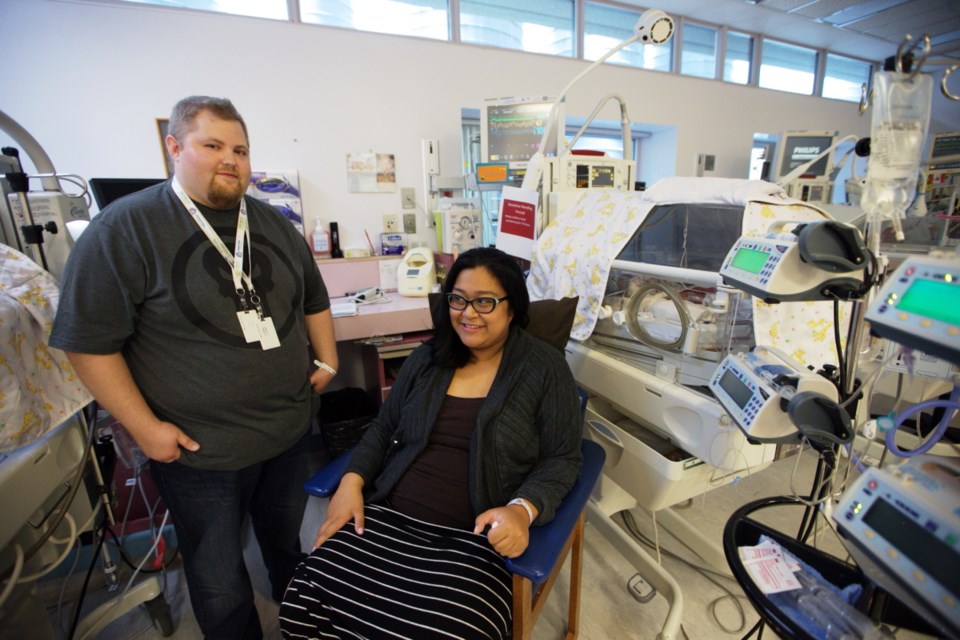Victoria General Hospital is awaiting its first donation of breast milk after Island Health was approved as a drop-off location for the B.C. Women’s Provincial Milk Bank.
It’s the first drop-off location on Vancouver Island and the 18th in B.C. The aim of the program is to expand the breast milk supply available to all premature babes in the province.
“We are anticipating Island moms will go through the screening process and start dropping milk off to us shortly because we are ready to roll,” said Gillian Kozinka, manager of Victoria General’s perinatal and neonatal services.
About 600 babies are admitted to Victoria General’s neonatal intensive care unit each year, including about 200 born premature. All babies born at 32 weeks or less are candidates for the donated milk.
Those infants don’t yet have the swallowing skills and strength to breastfeed — and most times their mother’s milk hasn’t come in yet — so donated milk is delivered through a feeding tube.
“Breast milk is the optimal choice for infant nutrition, and the new program benefits the tiniest, sickest babies in need,” Kozinka said.
Victoria General has been purchasing and using breast milk from the bank in Vancouver for several years.
This week, that milk has been helping twin boys born to Aissa and Jordan Blanchard of Nanaimo. On Saturday, Aissa, 27 weeks pregnant, felt something odd, went to hospital and delivered Lincoln and Easton.
The couple had prepared for the possibility that the twins would be born premature, “but something as simple as breastfeeding, you think you will just produce the milk and there you go, only to realize that’s not the case,” she said. “I was sad.”
Deciding to use donated milk was initially hard — “we had lots of questions,” she said — but the couple said they are grateful for the option of having a natural choice.
Clinical results have shown the benefits of using banked breast milk rather than formula for pre-term high-risk sick infants, Kozinka said. A reduction in diseases and less reliance on intravenous feeding are some of the benefits, she said.
It’s for that reason that the Health Ministry has increased funding to the program.
“If we can get more milk to the milk bank, then we can expand the criteria,” Kozinka said. “Right now the volume is low so we keep it for the most vulnerable babies.”
Victoria’s Mieko Bond, who used the milk bank to help feed her baby, Liam, called the Island collection site “fantastic.”
The day after delivering her infant in November 2015, Bond had to go into surgery to repair a broken knee cap. That disrupted the amount of milk she could supply.
With Liam, who has Down syndrome and was born with complications, in the pediatric intensive care unit for about three weeks, she relied heavily on the donated milk. “It probably almost saved his life.”
Donors can be healthy nursing moms or bereaved mothers who have lost their infants. All undergo screening — to ensure they are healthy and not taking medications or supplements — and a blood test.
The frozen milk is stored and transported to the provincial milk bank at B.C. Women’s Hospital in Vancouver. There the milk is pasteurized — partially sterilizing it to ensure it’s safe for consumption — and distributed to neonatal intensive care units across the province.
Frozen and pasteurized milk is not as good as fresh milk from a baby’s own mom, but it’s the next best thing — it includes all the same proteins and calories and benefits — and is better than formula, said Kozinka.
Island Health spokeswoman Kellie Hudson said the first goal is to promote local donations by raising awareness.
A cost-sharing agreement with B.C. Women’s Hospital will contribute funding for the freezer, required transport equipment and the first six months of transportation costs. Island Health will pay for staffing, promotions and operations and take over the cost of milk transportation in 2017, said Hudson.



